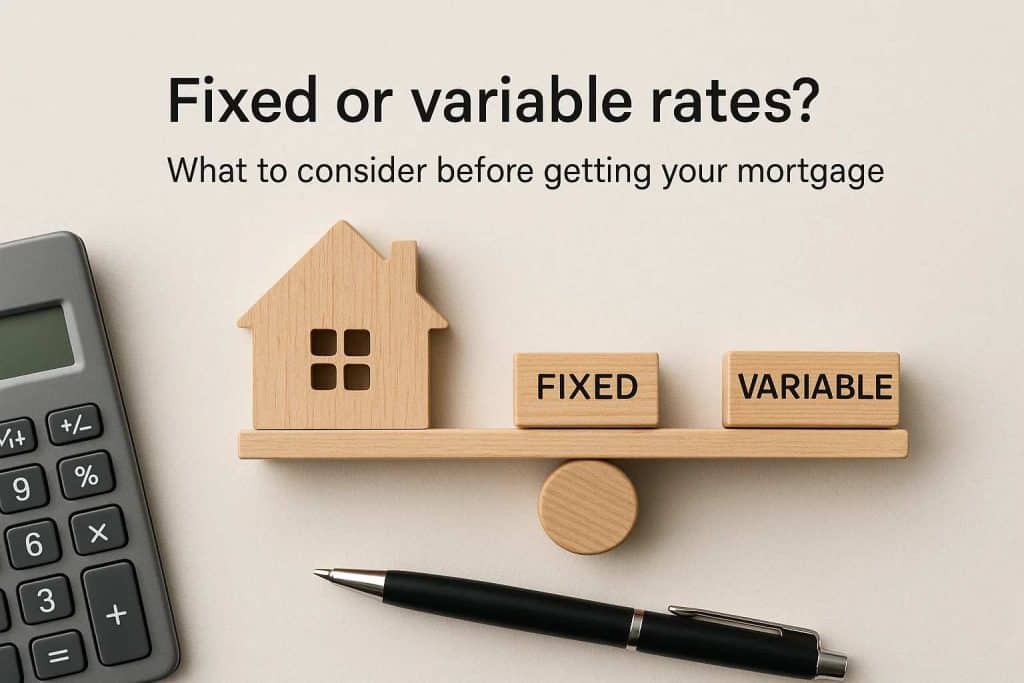Choosing the right type of interest rate for your home loan can be one of the most critical decisions in your home-buying journey. As you prepare to secure financing, it’s essential to consider whether a fixed or variable rate best suits your needs.
Both options have their advantages and challenges, and understanding these can help you make an informed choice that aligns with your financial goals. Here, we will explore the key factors to consider before getting your mortgage and how each option can impact your future payments.
Understanding fixed and variable interest rates

When considering home financing, the two predominant interest rate options are fixed and variable rates. Fixed interest rates remain constant throughout the entire loan term, providing predictable monthly payments. This option offers stability and peace of mind, especially if interest rates are expected to rise.
Opting for a fixed rate might be ideal for individuals who prefer consistency in their budgeting and wish to avoid the uncertainties associated with rising interest rates. Conversely, those comfortable with market variations and hoping for potential rate drops might find variable rates appealing. Understanding your financial comfort level and market trends can help steer your decision.
Factors to decide between fixed and variable rates
Several elements should be weighed when deciding between fixed and variable rate options. Current and expected future interest rates are pivotal. If you anticipate rates will rise, a fixed rate could secure your finances against future hikes. Conversely, a stable or declining rate environment may make variable rates more attractive.
Additionally, consider your long-term plans. If you plan to stay in your home for many years, a fixed rate might offer security. However, if relocation or refinancing is on the horizon, the initial lower rates of a variable option could save money in the short term. Also, evaluate your financial stability—those with steady incomes might lean towards fixed rates, while individuals with flexible budgets could benefit from variable rates.
Inflation and economic outlook
Inflation and the broader economic landscape are essential factors to consider when choosing a mortgage type. Inflation can lead to increased interest rates, impacting those with variable rate loans significantly over time. Understanding the current economic conditions helps in forecasting potential interest rate changes.
A robust economy might lead to increased rates due to higher inflation, making fixed rates more attractive. Conversely, in a sluggish economy, interest rates might remain low or even dip, potentially favoring variable rates. Keeping an eye on economic indicators and consulting with financial experts can provide valuable insights into potential rate trajectories.
Practical tips for choosing the right rate
To make an informed decision, assess your personal financial situation, including your risk tolerance and future stability. Regularly monitor economic forecasts and interest rate trends. Speaking with mortgage advisors can provide personalized insights into how market movements might affect your repayment plan.
Moreover, consider available financial tools that offer rate simulations based on different scenarios. This enables you to visualize potential changes in your rates and better prepare for future fluctuations. Maintaining a comprehensive understanding of both your personal finances and market trends positions you to choose the most suitable mortgage type.
Final thoughts on making your mortgage choice
Ultimately, deciding between a fixed or variable rate mortgage is deeply personal and dependent on a variety of factors. By thoroughly evaluating your financial circumstances, market conditions, and long-term goals, you can make an educated choice. A fixed rate offers predictability and peace of mind, while a variable rate might provide initial savings and flexibility.
Your comfort with risk and predictions about future economic conditions play critical roles in your decision. Remember, the right choice is the one that aligns with your financial objectives and lifestyle. Consider consulting professionals if you’re uncertain, as they can guide you toward a financial path that best meets your needs.

